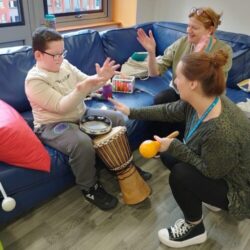
How COVID-19 has affected the charity sector and what you can do to help from your own home.
It comes as no surprise that businesses, communities and charities have been hit hard by COVID-19 in 2020. In fact, eight out of ten charities in the UK have stated that their financial and in-person aid has deteriorated drastically during the pandemic. Volunteering is no exception and has experienced huge changes since the outbreak.
A study from the AVSM (Association of Voluntary Service Managers) shows just how important volunteering is to us. Not only are volunteers essential to the running of hospices across the country, but they can also save millions of pounds a year through donated time and are vital for a sense of community engagement and support to those who need it the most.
Volunteers can do anything to help, from providing companionship to assisting in hospice and even specialist areas like cutting patients’ hair and teaching art or music therapy. Their contributions are vital to providing the best hospice care possible.
As well as this, the charity retail sector, which can collectively make up to 300 million pounds a year in funding, has suffered massively with the closing of retail shops all over the UK during lockdown. With funding challenges as well as a reduction in volunteer numbers, charities have definitely felt the loss.
Despite this hardship, there is always a silver lining. Whilst some may be unable to donate their money, they can still donate their time. It has become evident that COVID-19 has indeed accelerated the shift from face-to-face interaction to digital engagement. Not only this, but use of digital volunteering methods such as virtual training and remote roles can actually open up the door to a whole new group of volunteers (that are not restricted to geographical location).
At Claire House, we have seen this first-hand as volunteers across the country (not just in our catchment area) have got in touch to offer their help. We have also seen an increase in younger volunteers, those who have been furloughed and from ethnic minorities.
In some ways it has never been easier to become a volunteer. The training of volunteers that would usually take place in person over days can now be done online, making it more accessible. At Claire House, we aspire to encourage all those who wish to donate their time, skills and experience to do so by completing a simple online application form.
Engaging volunteers at grass roots level has now become more important than ever before. Volunteering among the under 35s has increased by over 50% since 2012. Interestingly, some studies on volunteering across many different charities show that whilst some older volunteers have unfortunately had to step back from volunteering due to shielding and health concerns, many younger volunteers have been keen to step in to help and donate their time whilst on furlough. Becoming a part of the volunteering community can help to give a sense of purpose and structure in a time when people need it the most!
So, what can you do to get involved from your home during lockdown? At Claire House, we’ve developed a huge range of remote opportunities that allow people to volunteer from home. Sue, who has been a volunteer receptionist at Claire House for two years, talks about how valuable her experience has been in the new volunteer befriender role:“ When lockdown happened, I got an email asking if anyone wanted to join the befriending programme. Straight away I said yes because it gave me an opportunity to speak to people and help them.
“A lot of the people I speak to are quite elderly so were shielding, with the oldest being 84 and the youngest being 60. Many didn’t have any family or friends. You could just tell the difference in their voices once you started chatting. The people I spoke to were just so grateful to hear someone else’s voice.”
Befrienders can call from a list of 20 people, to even just one a day – proving a little help can go a long way. Volunteers can also get involved with virtual coffee mornings, take part in interviews, share their skills in online workshops, deliver leaflets in their local community or raise awareness as an event ambassador.
Whilst we can’t wait until in-person volunteering can resume safely, one thing is certainly clear. Charities around the UK, including Claire House, have stepped up to the mark to evolve and adapt their volunteering programmes – examining new approaches to volunteering and offering a number of new remote roles, whilst also ensuring accessible opportunities.
We would like to encourage anyone who would like to donate their time an opportunity to do something amazing. Whether it’s offering a specific skillset or lending a sympathetic ear to others, we know the huge difference volunteering can make during this pandemic.
We asked Sue what she would say to someone considering the befriending role: “I would say give it a try. It sounds daunting but the volunteer coordinators are so supportive and are always at the other end of the phone if you need them. There’s very little admin to it and you can do it so easily on your laptop or phone., You will get as much from it as the person you are speaking to.”
Would you like to know more about the remote volunteering opportunities Claire House offers? Get in touch here.
Researched and written by Jamie Lee Nicholson, Claire House Volunteer Research Assistant.



